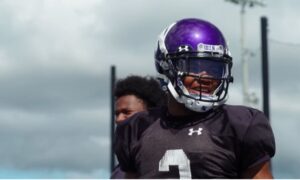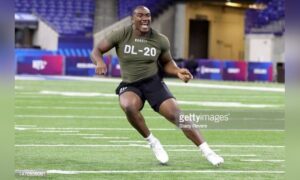“The players are one giant step closer to justice”, said Ramogi Huma following the ruling by the National Labor Relations Board yesterday that the student-athletes of Northwestern University are in fact employees of the school.
If that’s the case, then the road to athletes actually being paid a salary for their employment—which tends the be the end game in this discussion—is a long one.
But the ruling yesterday was not simply about financial compensation.
The ruling allows the Northwestern football players to form a union, and thus to have a voice to collectively bargain with the university about issues that are far-reaching and go far beyond payment beyond tuition and room and board.
While yesterday’s news currently only affects Northwestern, it is certain to spur copycat suits that could eventually reach a national level.
So what do they actually stand to gain in the immediate future, assuming the university’s appeal is ultimately denied and the ruling stands?
As mentioned, it gives them a voice, a seat at the table regarding decisions that are likely to affect their health and wellbeing.
Leo W. Gerard, the president of United Steelworkers (who helped bring the case to the board), had the following to say: “the key issue at Northwestern is negotiating better protections against concussions and improving medical coverage following graduation”.
Protection against the long-term effects of concussions and other significant injuries is obviously of great concern, but so are other standard interests that are commonplace within the professional ranks, including limiting exposure to hits during practice, as well as the number and duration of practices.
Unsurprisingly, all levels of college authority came out in opposition to the ruling, adamantly continuing to defend the notion of the student-athlete, which, in Huma’s words, the NCAA “invented…to prevent the exact ruling that was made” yesterday.
Said NCAA chief legal officer Donald Remy:
Over the last three years, our member colleges and universities have worked to re-evaluate the current rules. While improvements need to be made, we do not need to completely throw away a system that has helped literally millions of students over the past decade alone attend college. We want student athletes—99 percent of whom will never make it to the professional leagues—focused on what matters most—finding success in the classroom, on the field and in life.
Regardless of where one ultimately stands on the issue, I believe that Remy’s inclusion of the professional prospects of the average student-athlete is both telling and worrying. It insinuates that the ability for an athlete to succeed in the sport professionally is in some way tied to his rights as an employee, or ‘student-athlete’, for the university.
But this is something that everybody already knows the NCAA believes. As former Northwestern quarterback Kain Colter testified during the hearing when asked why the university provided him a scholarship, the reason is “to play football. To perform an athletic service”.
For the NCAA to even consider going down this road—of making the argument that athletic success is correlative to how valuable a scholarship is—would be foolhardy, as it only serves to strengthen the notion that the student-athlete is an employee, subject to dismissal relative to job performance.
Yesterday’s ruling may well be a “giant step” for player advocacy, in that it represents a turning of the tides in favor of student-athlete rights. But it is still one step in what could be a very long and litigious process when all is written.







